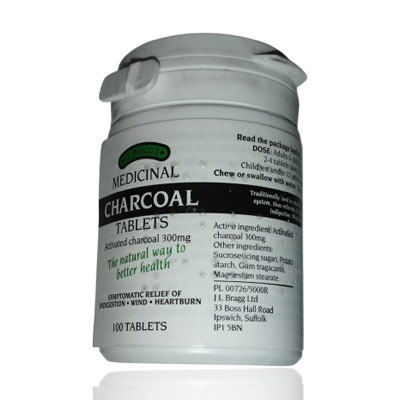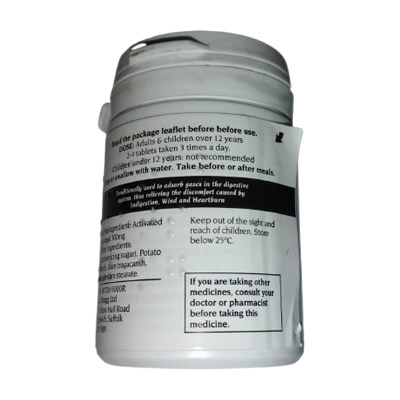Charcoal Tablets 100’s – Natural Relief for Bloating, Gas & Indigestion
Key Benefits of Charcoal Tablets
-
Natural Digestive Cleanser – Helps absorb toxins and relieve digestive discomfort.
-
Effective Gas & Bloating Relief – Reduces intestinal gas and eases abdominal bloating.
-
Supports Detoxification – Binds to unwanted substances in the stomach and intestines.
-
Non-Drowsy & Gentle on Stomach – Suitable for day or night use with minimal side effects.
-
Versatile Use – Ideal for food poisoning, indigestion, flatulence, and mild diarrhea.
Charcoal Tablets 100’s – Natural Relief You Can Trust
Charcoal Tablets are a fast-acting, natural remedy for a wide range of digestive issues including gas, bloating, indigestion, and mild cases of diarrhea or food poisoning. Each tablet contains activated charcoal, a highly absorbent substance known for trapping toxins and gases in the digestive tract, making them easier to eliminate from the body.
Perfect for individuals seeking a gentle, non-chemical approach to digestive relief, these tablets can be used by adults and older children. Whether after a heavy meal, stomach upset, or mild food reaction, Charcoal Tablets help soothe and cleanse your gut naturally.
Why Choose Charcoal Tablets 100’s?
-
Highly Absorbent Activated Charcoal – Binds with toxins and intestinal gases.
-
Natural & Chemical-Free Relief – Ideal for those preferring herbal and non-pharmaceutical solutions.
-
Quick Relief from Indigestion & Gas – Feel better faster after meals or stomach upset.
-
No Drowsiness or Harsh Side Effects – Safe for daily use as directed.
-
Trusted by Generations – A well-known remedy used in many households.
How to Take Charcoal Tablets
-
Adults: Take 2–4 tablets after meals or as directed by a healthcare provider.
-
Do not exceed 16 tablets in 24 hours.
-
Swallow tablets with a full glass of water.
-
Can be repeated after 2–4 hours if symptoms persist.
Key Ingredient
-
Activated Charcoal (300mg per tablet) – A natural ingredient used for centuries to relieve digestive discomfort by adsorbing toxins and gases.
Who Should Take Charcoal Tablets?
-
People experiencing bloating, gas, or indigestion.
-
Individuals with mild diarrhea or food poisoning symptoms.
-
Those who prefer natural remedies for gut health.
-
Anyone who wants to keep a digestive support remedy on hand after heavy or spicy meals.
Warnings & Precautions
-
Not suitable for children under 12 years unless advised by a doctor.
-
Avoid taking with other medications, as charcoal may reduce their effectiveness.
-
Consult your doctor if symptoms persist or if you’re pregnant or breastfeeding.
-
May cause dark-colored stools – this is harmless and expected.
Buy Charcoal Tablets 100’s at the Best Price from Pharmily
Get natural relief today with Charcoal Tablets 100’s from Pharmily – Kenya’s most reliable online pharmacy.
-
100% genuine products
-
Quick and secure delivery to your doorstep
-
Affordable pricing on everyday health essentials
FAQs About Charcoal Tablets
Q: Can I take charcoal tablets daily?
A: Yes, but only as needed. Frequent or long-term use should be under medical guidance.
Q: Can charcoal tablets be taken on an empty stomach?
A: Yes, but they work best after meals or when digestive symptoms arise.
Q: Do charcoal tablets interfere with other medications?
A: Yes. Take them at least 2 hours apart from any other medication to avoid absorption issues.


